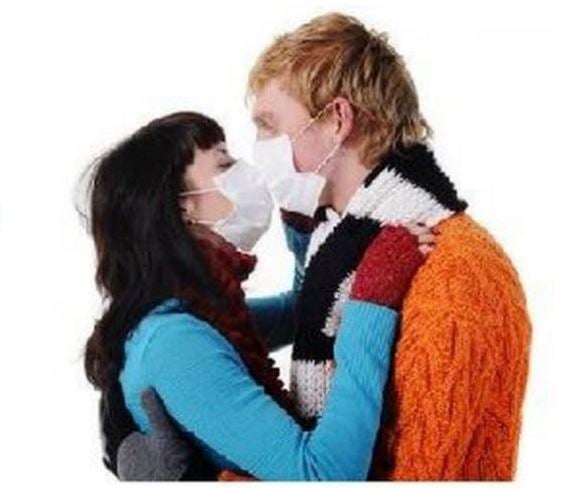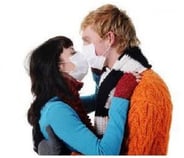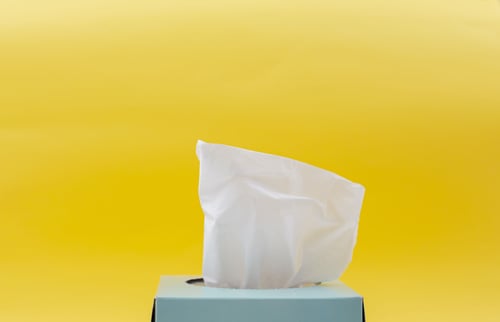
Infectious Mononucleosis, more frequently referred to as “mono”, is caused by the Epstein-Barr virus (EBV) and is very common. Although it has also been associated with names such as “The Kissing Disease”, mono is not classified as a sexually transmitted infection. It is however transmitted through saliva, which can be exchanged during sex.
Unfortunately, mono has an an incubation period of 4-8 weeks. The incubation period is the time it takes from contracting the virus to developing symptoms. What’s worse is that the virus stays in your body for life and may reactivate years later. If this happens you may or may not develop symptoms, but you can still pass it on to others.
incubation period is the time it takes from contracting the virus to developing symptoms. What’s worse is that the virus stays in your body for life and may reactivate years later. If this happens you may or may not develop symptoms, but you can still pass it on to others.
Symptoms of mono typically include fever, sore throat, swollen lymph nodes, and fatigue. Headache, body aches, and a rash may also be present. These same symptoms are often seen in a lot of other viral illnesses as well, which is why mono may be easily mistaken for something else. Mono occurs mainly in children, adolescents, and young adults (up to age 25). Most older adults typically don’t get mono because they have already had it in the past.
Mono is usually benign (not dangerous). Some children may not develop any  symptoms at all. Most others will develop symptoms as above, which will typically resolve within 2 weeks. Fatigue may persist for several months. Mono can cause your spleen to enlarge temporarily. This puts your spleen at risk of rupture. If you are diagnosed with mono, you should avoid contact sports for at least one month. Mono may also cause an abscess, or collection of pus, to form in your throat. This abscess may cause you to have difficulty swallowing and if large enough, can obstruct your airway. If you are experiencing any difficulty breathing, contact your doctor or call 911 immediately.
symptoms at all. Most others will develop symptoms as above, which will typically resolve within 2 weeks. Fatigue may persist for several months. Mono can cause your spleen to enlarge temporarily. This puts your spleen at risk of rupture. If you are diagnosed with mono, you should avoid contact sports for at least one month. Mono may also cause an abscess, or collection of pus, to form in your throat. This abscess may cause you to have difficulty swallowing and if large enough, can obstruct your airway. If you are experiencing any difficulty breathing, contact your doctor or call 911 immediately.
Although most cases of mono are mild and can be managed at home with over the counter medicines, it may be worthwhile to see your doctor for a COVID-19 test as symptoms for the two conditions often overlap. Your doctor may run other tests as well to rule out infections such as the flu or strep throat. Please remember that if you are diagnosed with COVID-19, flu, mono, the common cold, then your doctor will likely not prescribe antibiotics as these are all VIRAL infections. Antibiotics will only work for bacterial infections such as strep and many cases of pneumonia. Sometimes if amoxicillin is accidentally given to patients with mono, it might induce a rash causing the patient to falsely believe they have a penicillin allergy.
Treatment of mono involves supportive care only. Tylenol and/or ibuprofen will help with fever or pain. Fluids, adequate nutrition, and rest will help with symptoms of fatigue and malaise. Steroids have not been proven to help in cases of mono. And again, antibiotics WILL NOT work.
Wearing a mask and socially distancing during this pandemic has helped to reduce the transmission of many viral illnesses, such as mono. However, mono is often transmitted from a loved one or other close contacts, which we typically are not wearing masks around. In these cases, mono is really difficult to prevent. Its best to limit these cases by washing your hands regularly, not drinking after each other, and not sharing eating utensils.
 Dr. Pradhan is a resident physician who sees patients of all ages and provides obstetrical services at Lone Star Family Health Center, a non-profit 501©3 Federally Qualified Health Center operating facilities in Conroe, Spring, Willis, Grangerland, and Huntsville, and serving as home to a fully integrated Family Medicine Residency Program to increase the number of Family Medicine physicians for Texas and our community.
Dr. Pradhan is a resident physician who sees patients of all ages and provides obstetrical services at Lone Star Family Health Center, a non-profit 501©3 Federally Qualified Health Center operating facilities in Conroe, Spring, Willis, Grangerland, and Huntsville, and serving as home to a fully integrated Family Medicine Residency Program to increase the number of Family Medicine physicians for Texas and our community.

-1.jpg?width=500&name=Johnson%202%20(1)-1.jpg)
.jpg?width=500&name=Keating%232%20(002).jpg)
